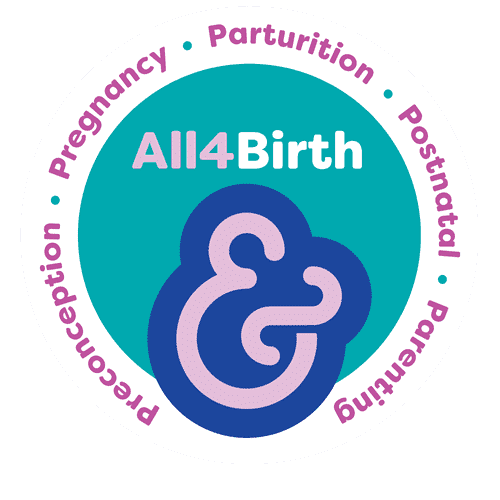Abbie Tomson
Midwife MSc, BSc, Yoga Teacher, Project Lead at All4Birth
@enevlorel @All4Birth
Summary
Polycystic Ovary Syndrome (PCOS) is a common endocrine disorder affecting approximately 1 in 10 women of reproductive age. Characterised by irregular menstrual cycles, hyperandrogenism, and polycystic ovaries, PCOS can have significant implications for women’s health from preconception through to parenting. This article explores the aetiology, signs and symptoms, and the impact of PCOS across various stages of motherhood, with a focus on UK guidance and evidence-based recommendations.
Aetiology of PCOS
The exact cause of PCOS remains unclear, but it is believed to result from a combination of genetic and environmental factors. Insulin resistance is a common feature, leading to hyperinsulinemia which, in turn, stimulates ovarian androgen production. Elevated androgen levels disrupt follicular development, resulting in the characteristic polycystic ovaries and anovulation associated with PCOS. Genetic predisposition also plays a role, with familial clustering observed in many cases.
Signs and Symptoms
PCOS manifests through a spectrum of symptoms, which may include:
- Irregular menstrual cycles or amenorrhoea
- Hirsutism (excessive hair growth on the face, chest, or back)
- Acne and oily skin
- Weight gain or obesity, particularly central adiposity
- Thinning hair or male-pattern baldness
- Difficulty conceiving due to anovulation
The diagnosis of PCOS typically requires the presence of at least two of the following criteria (Rotterdam criteria):
- Oligo- or anovulation
- Clinical and/or biochemical signs of hyperandrogenism
- Polycystic ovaries visible on ultrasound
Impact on Preconception and Fertility
PCOS is a leading cause of infertility due to its association with anovulation. Women with PCOS may require longer to conceive, and some may need fertility treatments. The National Institute for Health and Care Excellence (NICE) guidelines recommend lifestyle modifications, including weight loss and exercise, as first-line interventions to improve ovulatory function. For those requiring medical treatment, options include clomiphene citrate, letrozole, and metformin. In vitro fertilisation (IVF) may be considered for women who do not respond to pharmacological treatments.
Pregnancy and PCOS
Women with PCOS are at an increased risk of pregnancy complications such as gestational diabetes, preeclampsia, and preterm birth. Regular antenatal care is crucial to monitor and manage these risks. NICE guidelines emphasise the importance of preconception counselling and optimising health before pregnancy. This includes achieving a healthy weight, managing blood glucose levels, and addressing any coexisting conditions.
Breastfeeding and PCOS
Breastfeeding has numerous benefits for both mother and child, and its impact on women with Polycystic Ovary Syndrome (PCOS) is a topic of ongoing research. While the evidence is still emerging, several studies and expert guidelines provide insights into how breastfeeding can influence PCOS and vice versa.
Benefits of Breastfeeding for Women with PCOS
- Hormonal Regulation: Breastfeeding has been associated with hormonal changes that may positively influence the symptoms of PCOS. Lactation induces a natural suppression of androgens, the male hormones that are typically elevated in women with PCOS. This can potentially help in reducing androgen-related symptoms such as acne and hirsutism.
- Weight Management: Women with PCOS often struggle with weight management due to insulin resistance and metabolic issues. Breastfeeding can increase caloric expenditure, which may assist in postpartum weight loss and improve metabolic health, thereby addressing one of the key challenges faced by women with PCOS.
- Reduced Risk of Type 2 Diabetes: Breastfeeding has been shown to lower the risk of developing type 2 diabetes later in life. Since women with PCOS are at a higher risk for insulin resistance and diabetes, prolonged breastfeeding might offer protective benefits.
Challenges and Considerations
- Milk Supply Issues: Some women with PCOS may experience difficulties with milk supply. This can be due to hormonal imbalances that affect the production of prolactin, the hormone responsible for milk production. Consulting with a lactation specialist can help address these challenges and provide strategies to enhance milk supply.
- Delayed Lactation: PCOS is sometimes linked to delayed lactation, meaning that milk production might start later than usual. Awareness and preparation for this potential delay can help mothers manage expectations and seek appropriate support if needed
Evidence-Based Management and Support
NICE guidelines serve as a comprehensive resource for the management of PCOS across all stages of a woman’s reproductive life. Key recommendations include:
Lifestyle Interventions: Emphasis on diet, exercise, and weight management
Medical Treatments: Use of medications like clomiphene, letrozole, and metformin for fertility
Monitoring and Screening: Regular screening for metabolic complications and mental health issues
Conclusion
PCOS is a multifaceted condition with implications that extend from preconception to parenting. Understanding its impact and following evidence-based guidelines can help manage the condition effectively, ensuring better health outcomes for women and their families. By staying informed and proactive, women with PCOS can navigate the challenges and joys of motherhood with confidence.
Links to other resources
 Books
Books
Brain Health from Birth: Nurturing Brain Development During Pregnancy and the First Year by Rebecca Fett
Real Food for Pregnancy by Lily Nichols
Functional Maternity: Using Functional Medicine and Nutrition to Improve Pregnancy and Childbirth Outcomes by Sarah Thompson
 Film Audio and Apps
Film Audio and Apps
Baby Buddy app, created by the Best Beginnings Charity
 Websites
Websites
Baby Buddy App
The Lancet | Preconception Health
Verity – The Polycystic Ovaries Self Help Group – A UK charity offering extensive resources, support groups, and forums for women with PCOS. Verity
Tommy’s PCOS Information – Offers information and support for those dealing with PCOS and its impact on fertility. Tommy’s Website
References
- National Institute for Health and Care Excellence (NICE). (2018). Polycystic Ovary Syndrome: Diagnosis and Management. Available at: [NICE website](https://www.nice.org.uk/guidance/ng23)
- Royal College of Obstetricians and Gynaecologists (RCOG). (2015). Long-term Consequences of Polycystic Ovary Syndrome. Available at: [RCOG website] (https://www.rcog.org.uk/en/guidelines-research-services/guidelines/gtg33/)
- NHS. (2023). Polycystic Ovary Syndrome (PCOS). Available at: [NHS website](https://www.nhs.uk/conditions/polycystic-ovary-syndrome-pcos/)










